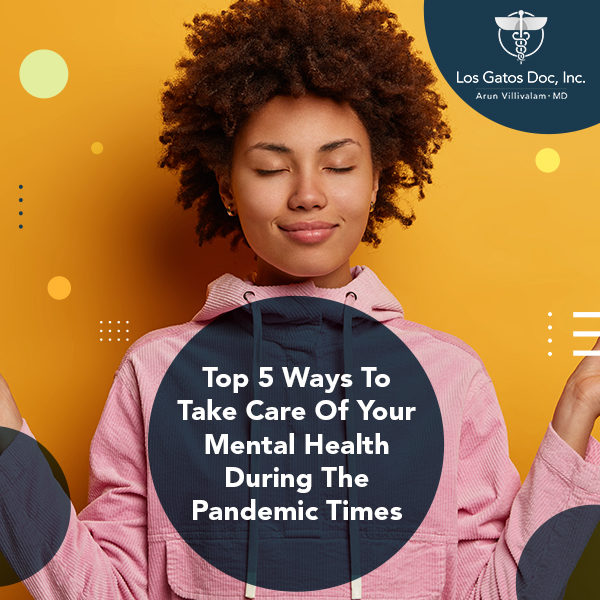The COVID-19 pandemic has played havoc with our mental health. Everyone is affected and suffering – children, adolescents, adults, and older adults.
Over 42% of American adults reported symptoms of anxiety and depression during the pandemic as of December 2020, according to a study published by the Centers for Disease Control and Prevention (CDC). It is a huge increase from the reports of 11% of Americans with symptoms of anxiety and depression as of June 2019.
It can be challenging to make sense of the current reality in times of great uncertainty and let it not affect our health adversely.
Our article will help you understand the link between COVID-19 and your mental health, the telling signs, and what you can do to cope and heal during the pandemic.
Understanding The Impact Of COVID-19 On Your Mental Health
Before we can talk of solutions, we need to understand the problem at hand first.
Fear, anxiety, and stress are normal reactions to any form of threat, including the alien, deadly and unpredictable coronavirus.
Women, especially those with children, were reported to have worsened mental health issues than men with children.
The association between loneliness with reduced lifespan and increased risk of illnesses is scientifically proven. The coronavirus has rendered many people to become lonely and their health highly vulnerable to various illnesses.
Learning how to manage your mental health will help you and those around you become more resilient.
Top Tips To Take Care Of Your Mental Health
Here are some of our recommended strategies and suggestions to help you feel and cope better with your mental health.
- Know The Symptoms
The quicker you can identify the signs of mental health illnesses, the faster you can take action to recover more quickly.
According to a KFF Health Tracking Poll from July 2020, some of the common symptoms reported by people during the pandemic are:
- Increase in anxiety and depression
- Low self-esteem
- Sleeping troubles
- Loss in appetite
- Worsening chronic conditions
- Increase in alcohol consumption and substance use
- Increase in suicidal thoughts
Symptoms of mental health illnesses look different for different people.
You may experience some or more of the listed symptoms above if you are suffering from mental health issues in these times.
- Manage Stress
There are several ways you can manage stress, and we list some of them here:
- Pause your daily routine to catch long breaths for around five minutes. Studies show that taking these long, deep breaths compared to shorter breaths can calm your nerves. You can add gentle stretches further to ease your mind, body, and soul.
- Reflect in your journal every day. Make it a daily practice to reflect and write about your day.
- Stay away from negativity. Take a break from reading or watching disturbing news and stories. While it’s good to stay informed about the current world, spending too much time poring over unpleasant news can be detrimental to your mental health.
- Take a walk. Literally walking away from the problem for a while outdoors can do wonders to finding your calm and possible solutions.
- Plan and make time for things that you enjoy doing every day.
- Follow A Healthy Routine
Maintaining a healthy routine that balances the various aspects of your life is key to good health.
Self-care is not a luxury, but it is essential for physical and mental health.
Take care of your body by nourishing it well with a variety of fruits, vegetables, whole grains, and lean protein.
Stay active during the day and have a regular exercise routine. This healthy habit helps release chemicals like endorphins in your brain that boost your mood.
Limit or avoid tobacco and alcohol consumption.
Getting plenty of sleep during the night and catching an afternoon nap during the day can help you relax and feel much better. Aim for going to bed and waking up each day at the same time.
Stay on top of your routine doctor visits, screenings, and vaccinations. We trust you’ve taken your COVID-19 vaccine by now. If you haven’t, we suggest you do so at the earliest and protect yourself and our community.
- Practice Empathy
Start by being kind to yourself and extend that to your family, friends, and community.
Connecting with others makes you not just feel lighter; it makes the other party feel much better too. During the pandemic, you can stay in touch with others via phone, video calls, and conferences and feel less lonely and isolated.
If you know anyone who’s not feeling too well in your social circles or vice versa, try to spend time with them even if you don’t feel like it.
But there is a way to communicate with people who have felt under the weather for a long time. Being empathetic and listening without judgment might be more effective than making prescriptive statements such as:
“Count your blessings. Be grateful.”
“We all have our good and bad days.”
“Spend more time outside.”
Being in an acute depression can make you look at the world through a ‘black and white’ lens, while the rest may see it in color.
How we communicate to those experiencing mental health issues and make them feel loved are critical to their recovery and healing. It is usually easier said than done because of the following reasons:
The person who feels depressed might completely shut off and withdraw from people they know or everyone. You may find it hard to break through them and understand their needs in such cases.
It may not be easy to make someone who’s depressed feel loved and better as they tend to be irritable, cynical, caustic, and escapist.
Grief and anxiety manifest in various ways. Some people might try to mask their true feelings by escaping from them and seeking social interactions and pursuing happiness. This escapist tendency might deceive you into believing that the person who is depressed is emotionally stable and mentally healthy.
- Reach Out For Help
The sooner you understand that the measures you’re taking on your own are not helping, the quicker you can be on the path of healing and recovery.
Get the right kind of support for you or your loved ones who are feeling anxious and depressed, and start transforming for the better.
You can first call your healthcare provider, such as Los Gatos Doc. We offer Stress Management services, giving you the clarity and suggested treatment to improve your mental health. Medication can be one of the treatment strategies, but there are several other forms of therapy to help you beat anxiety and depression. Your doctor might prescribe a combination of therapy and medication as a treatment to help you cope and recover.
Reaching out for help can save lives. If you have an immediate crisis on hand that requires urgent action, here are a few contact details you can make a note of:
- Emergency: 911
- National Suicide Prevention Life: 1-800-273-TALK (8255) for English, 1-888-628-9454 for Spanish
- Veteran’s Crisis Line: 1-800-273-TALK (8255)
- Crisis Chat or text: 8388255
- Disaster Distress Helpline: CALL or TEXT 1-800-985-5990 (press 2 for Spanish).
Conclusion
Mental health problems are commonplace in pandemic times, and it is natural to feel anxiety and stress in response.
We have several effective treatment strategies and tools to help you cope with stress and overcome mental health illnesses.
If you want to reach out for consultation on Stress Management, you can contact Los Gatos Doc, the best primary care doctor near Campbell, CA.
Disclaimer: We routinely draw upon public health resources to inform our write-ups. Information in this article may be drawn up from multiple public health sources, including:
- Centers for Disease Control & Prevention
- Medline Plus
- National Institutes of Health
- American Medical Association
- American Association of Family Physicians
- Mayo Clinic
- Family Doctor






